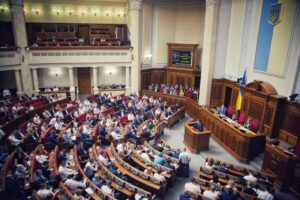
MPs propose to stop enrolling students in higher education institutions for bachelor’s and master’s degrees in the evening and part-time programs, as well as for junior bachelor’s degrees, starting next year.
A group of MPs has registered Bill No. 10092 on amendments to certain laws regarding the state final certification and the 2024 admission campaign in the Verkhovna Rada, the parliament’s website reports.
The bill proposes to amend the law “On Higher Education” to establish that in 2024, admission to higher education will be carried out in a special procedure determined by the executive body in the field of education and science.
According to the proposed amendments, in 2024, competitive selection for higher education on the basis of complete general secondary education is carried out on the basis of the results of the external independent evaluation in 2021 and/or entrance examinations in 2022-2024, conducted using the organizational and technological processes of external independent evaluation and creative competition (physical ability competition).
The draft law also proposes to establish that in 2024, the entrance exams will include the Ukrainian language, mathematics, history of Ukraine, and a subject of choice (physics, chemistry, biology, foreign language, geography, Ukrainian literature).
In addition, the authors of the draft law propose to supplement the Law “On Complete General Secondary Education” with provisions exempting students who complete their studies at each level of complete general secondary education from state final certification. For students who will complete their primary education in 2024, it is proposed to conduct state final certification in a pilot mode.

Patient organizations call on the parliament of Ukraine to adopt at the final reading bill No. 4662, which will provide the possibility of purchasing medicines under controlled access contracts and the Ministry of Health will be given an opportunity of developing the appropriate regulatory framework for the implementation of the controlled access contracts mechanism by the end of 2021.
“Three weeks ago, we wrote open letters to [Chairman of the Parliament Dmytro] Razumkov from all patient organizations (over 30) with a request to bring this bill into the hall. We also wrote letters to the chairmen of all factions with a request to support this bill. We hope that they will support it, since patients need it,” Chair of the Council of the Orphan Diseases of Ukraine NGO Tetiana Kulesha said at a press conference at Interfax-Ukraine on Monday.
According to her, the controlled access contracts mechanism will allow purchasing drugs with a 20-50% discount. Pharmaceutical companies are ready to supply drugs at a reduced cost on conditions of confidentiality and without using public tender procedures, since there is no alternative drug and there cannot be a better offer. Under this procedure, some countries purchase medicines for more than 250 diseases.
“Patients are not provided with the necessary drugs, because they are expensive, unregistered in the country and the state practically does not buy them. The mechanism for the procurement of such drugs under controlled access contracts is effective in 15 countries of the world. This week we are submitting for the second reading the corresponding bill to introduce such a mechanism in Ukraine,” MP Oksana Dmytrieva (the Servant of the People parliamentary faction) said.
According to her, the Ministry of Health will need up to three months to develop a regulatory framework, and after its introduction, the controlled access contracts mechanism will operate for three years as a pilot project.
“Our model of public procurement, unfortunately, does not cover the purchase of all the necessary drugs, in particular for orphan patients. The bill will create special conditions to provide such patients with drugs,” MP Oleksiy Movchan (the Servant of the People faction) said.
As reported, the bill was adopted at the first reading in the spring of 2021.

MPS propose to amend the state budget for 2021 and distribute UAH 38.75 billion of additional receipts, including UAH 12 billion for subsidies and UAH 15 billion for the repair of national roads.
Bill No. 6052 was registered by a group of MPs in parliament on Tuesday.
According to an explanatory note to the bill posted on the parliament’s website, it is proposed to increase receipts from corporate income tax – by UAH 30 billion, VAT on imports – by UAH 6 billion, VAT on goods manufactured in Ukraine – by UAH 2 billion, fee paid during the legal process for establishing ownership to cars – by UAH 0.75 billion.
At the expense of these additional receipts, the MPs propose to increase spending on subsidies by UAH 12 billion, to UAH 47.295 billion, according to the bill.
In addition, the MPs propose to provide for an additional amount of funding for the road infrastructure in the amount of UAH 15 billion.
“In particular, in 2021, it is planned to carry out repair and construction work on a total length of 4,500 km of state highways, but the existing funding is currently insufficient to implement these plans,” the authors of the bill said in the explanatory note.
The bill also proposes to send additional funding in the amount of UAH 2.5 billion for the construction of social and cultural facilities, transport infrastructure. Thus, it is proposed to increase the amount of subventions from the state budget to local budgets by the indicated amount.
In addition to this, the bill proposes to allocate UAH 1.5 billion from additional receipts for the construction of projects within the framework of the Big Construction state program.
Another UAH 1 billion is proposed to be used to pay off debts and pay salaries to employees of state-run mines. In addition, the MPs propose to allocate UAH 556 million to replenish the charter capital of the state-owned enterprises Boryspil International Airport, Ukraine state aviation enterprise and Ukrservice of the Transport Ministry.
Amendments to the current state budget also imply the following directions: UAH 282 million to provide housing for 215 internally displaced persons who defended the sovereignty of Ukraine, UAH 280.5 million for timely settlements with dismissed military personnel, UAH 176.8 million for providing prisons with food and settlements for utilities, UAH 86.9 million for a budget program for the development of an emergency medical care system and modernization of the material and technical base of healthcare institutions, as well as UAH 10 million for additional circulations of the Uriadovy Kurier newspaper.

The Verkhovna Rada is proposed to introduce ceiling prices for certain types of export products, upon exceeding which exporting companies will be obliged to pay 50% of the revenues received in excess of the established limit to the state budget, which will make it possible to replenish the state budget for a total amount of $ 6.37 billion per year and redirect these funds to support the social sphere.
Corresponding bill No. 5666 was registered in the Verkhovna Rada on June 16 by MPs Oleh Dunda, Bohdan Yaremenko and Oleksandr Aleksiychuk (all of them are from the Servant of the People parliamentary faction).
According to an explanatory note to the bill, it is proposed to tax a portion of foreign currency earnings exceeding the limits established by the bill with a 50% tax. For wheat, the limit is proposed to be set at $ 230/tonne (as of June 1, its average export price is $ 283/tonne), corn – $ 170/tonne ($ 271/tonne), rapeseeds – $ 350/tonne ($ 568/tonne), oats – $ 230/tonne ($ 265/tonne), sunflower oil – $ 850/tonne ($ 1,300/tonne). Accordingly, if a 50% tax is imposed on part of the profits received by exporters in excess of the established limits, the state budget will receive $ 450 million from taxation of exported wheat, corn will bring $ 1.21 billion, rapeseeds – $ 440 million, oats – $ 10 million, sunflower oil – $ 1.57 billion, the document says.
It is also proposed to tax the profits exceeding the established limits for exporters of iron ore, steel scrap and rebar, aluminum, copper, zinc and nickel.
According to the explanatory note to the document, the taxation of “excess profits” in these commodity groups will make it possible to replenish the state budget for a total of $ 6.37 billion per year.
“The tax is levied on excess profits, that is, the profits that a business entity received by taking advantage of the favorable market conditions. Usually this is a temporary measure that is applied when the country’s budget is experiencing an acute deficit,” the authors of the bill explain.

A group of MPs from the Servant of the People faction have proposed to raise the retirement age of Ukrainians to 61 years. The text of bill No. 5566 was published on the website of the Verkhovna Rada.
Among the authors of the bill are Head of the committee on social policy and protection of the veterans’s rights Halyna Tretiakova, as well as MPs Iryna Vereschuk, Mariana Bezuhla, Olha Vasylevska-Smahliuk and others.
The authors of the legislative initiative propose to increase the retirement age by one month annually, starting from January 1, 2023. This increase will raise the retirement age in Ukraine by one year and will reach 61 years until 2035.
At the same time, the bill provides that women who have given birth to a child and raised him or her to the age of six have a right to reduce the retirement age by six months.
The bill proposes to amend Articles 26 and 115 of the law on compulsory state pension insurance.
If adopted, the bill will enter into force on January 1, 2022.

A group of MPs has registered bill No. 4245 with amendments to the Budget Code on the electronic residency mechanism, which implies a preferential income tax rate of 5%, in the Verkhovna Rada.
According to the information on the parliamentary website, the bill was registered on October 21 by MPs from the Holos faction Yaroslav Zhelezniak, Volodymyr Tsabal, Kira Rudik and Halyna Vasylchenko, as well as MP from the Servant of the People Danylo Hetmantsev.
“The idea is simple. If you are an IT specialist from India, China, Pakistan, Germany, or even Belarus, then, being in your country, you can become an electronic resident, that is, an electronic taxpayer. And for this you will pay only one simple tax – 5%, which our sole proprietors pay from turnover,” Zhelezniak said.
According to him, this mechanism may be of interest, in particular, to citizens of Asian countries. On the other hand, this will allow attracting additional funds to the national budget, he said.
“This proposal may not be so interesting to the United States or the EU, but it will definitely be interesting to other countries, especially Asia, the East, which have not a better reputation and more complex tax legislation compared to the Ukrainian one,” Zhelezniak said.